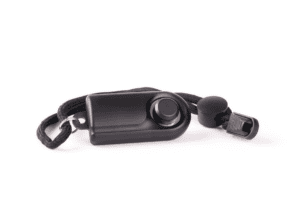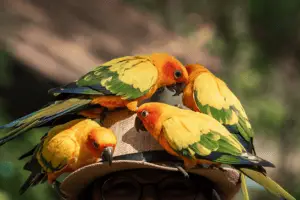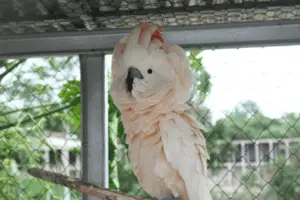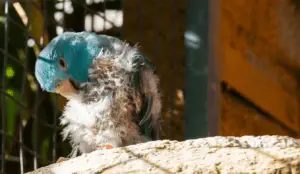Known for its stunning form and beautiful colors, the Blue and Gold Macaw truly is a glorious bird to look at, and it is no question to know that this bird also comes with a hefty price. Aside from its striking colors, it also is brilliant and, most significantly, high in demand.
With such a hefty price tag, it is also crucial to determine how to take care of your Gold and Blue Macaw properly. This article will discuss the factors contributing to the hefty pricing of the Gold and Blue Macaw and the essential things to know.
Key Takeaways
- The price of Macaw Blue and Gold
- Things you need to know before owning a Macaw Blue and Gold
- The considerations to make before purchasing a Blue and Gold Macaw.
The Macaw Blue and Gold price can vary significantly due to many factors, such as location, bird’s age, gender, and pedigree. Nevertheless, you can typically get a Blue and Gold Macaw from $1000 to $3000.
When planning to buy a Blue and Gold Macaw, there are many considerations to consider before pushing this bird. The endless factors and variables affecting your final choice can get quite intimidating.
Nevertheless, as an aspiring Blue and Gold Macaw owner, you should at least be familiar with the basics, especially before going out and making an impulse purchase. Below, we tackle the Macaw Blue and Gold price and everything you need to know.
The Things You Need To Know Before Purchasing A Blue and Gold Macaw
Making hasty decisions while deciding whether a Blue and Gold Macaw is a good option for your next pet, especially without proper research, can result in a lose-lose situation for your Macaw and you, especially when the decision dictates the fate and well-being of an animal. That said, conducting proper research is critical.
Here are seven essential things to know about a Macaw before welcoming it to your home:
- Diet
- Housing
- Socialization
- Behavioral Problems
- Lifespan
- Noise
- Health Concerns
Diet
People neglect the diet of Macaws a lot of the time. Which in turn results in malnourishment and sickness. That said, when preparing to welcome a Blue and Gold Macaw to your home, you must have the proper knowledge concerning their diet.
While wild Macaws might be able to forage for food alone, the caveat of having companion Macaws is that they cannot forage for food. Your bird will rely on you to feed it properly and ensure it is healthy.
Blue and Gold Macaws have strict diet requirements that require intensive planning. Typically,
their primary diet should consist of fruits, vegetables, seeds, nuts, leaves, and bark, according to VCA Animal Hospitals. Always confirm with your veterinarian for an efficient and safe diet plan for your Blue and Gold Macaw. After all, your bird’s life depends on it.
Housing
A critical part of preparing for a Blue and Gold Macaw is understanding the importance and definition of good shelter. While it is not necessarily true that Macaw enclosures are hard to choose, it’s not a mundane task either. Truly a task that one should not relegate as a last-minute decision.
Planning for a Blue and Gold Macaws enclosure is an intensive process that requires much research and planning. This article section will discuss choosing the perfect enclosure for your Macaw.
One of the most crucial things to consider when purchasing an enclosure for a Macaw is its size. Admittedly, the size of Blue and Gold Macaws varies greatly, from their gender to their upbringing. Besides, purchasing a standard cage size should be your best bet.
Macaws should reach around a foot in height by size, but depending on the variety, they can even get three feet in height. Nevertheless, it is crucial to consider the consensus when purchasing cages for Macaws, according to study.com.
The size of your Macaw cage should be at least 36 inches wide, 48 -inches deep, and 60 inches tall to give your Macaw. Moreover, it would be best to look out for toxic materials. Some plastic cages and coatings have seriously carcinogenic properties. It is also essential to buy from local, non-toxic options.
Lastly, consider the extra features each bird cage might introduce as a quirk, such as designated roosting and play zones.
For a mentally stimulating cage placement, you should place the cage near a window for optimal sunlight and cognitive exposure.
Socialization
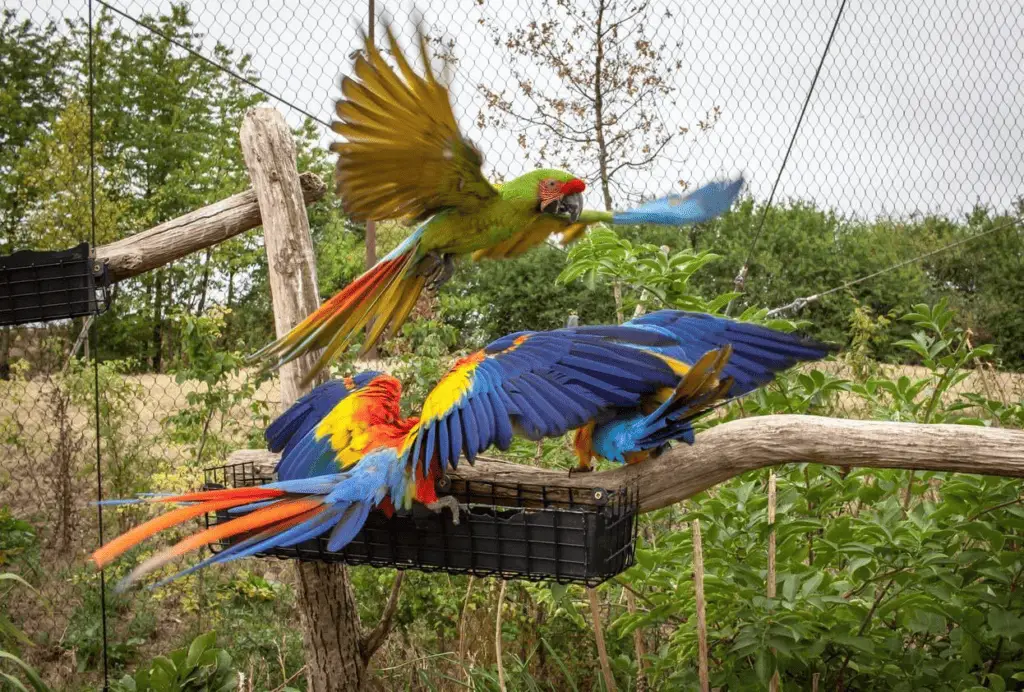
An underlooked component that many fail to consider when purchasing a Blue and Gold Macaw is the socialization aspect of their pet. While Macaws have physical needs such as food, water, and shelter, they also manifest emotional needs such as socialization and playtime.
Socialization is a bird’s mechanism wherein they initiate and learn how to function effectively within a human flock to put the concept of socialization into perspective.
Typically, in the wild, baby Blue and Gold Macaws learn to develop their instincts in hunting for food and other survival skills within the first two years of their life, providing ample time for them to have a firm grasp on such critical concepts.
However, time could be more lenient towards companion Blue and Gold Macaws. As such, according to Avian Enrichment, it can be pretty frustrating for other pet owners when their Macaw acts “problematically” within the context of human norms.
As responsible pet owners, we should teach our Macaws how to interact with humans appropriately and what they should and should not be doing while providing support as they traverse through this intensive and rigorous training process. After all, we don’t necessarily have two years dedicated to teaching our Macaw.
An excellent way to initiate socialization is by introducing them to social circles along with other avian owners, making them familiar with other birds, and introducing them to new faces.
Behavioral Problems
Speaking of socialization, a result of improperly socialized Blue and Gold Macaws can result in the development of behavioral problems. However, aside from a lack of socialization, behavioral problems alone can be a warning sign of unfulfilled needs.
While many of these behavioral problems are minor, it is also crucial to understand that they can lead to significant issues later when left untreated. As such, you should know how to assess and identify behavioral issues immediately.
Typically, behavioral problems manifest in the following forms:
- Biting is a minor behavioral problem typically expressed by Macaws due to fear, frustration, and aggression. You can attempt to conduct a positive reinforcement training program to alleviate this issue.
- Another minor behavioral problem is screaming. While screaming is perfectly normal to Macaws, there are instances when they might go overboard. Socialization should teach your Macaw how to turn it down a notch and vocalize properly without causing significant disruptions.
- A major behavioral problem is self-mutilation, such as feather plucking. Self-mutilation can result in infections and bleeding. A lack of stimulation manifests as self-mutilation, resulting in infections and bleeding. Playtime is critical, and stimulating your Macaw should help reduce this behavior. Purchasing interactive toys and bonding with them regularly should provide excellent support and reduce the risk of feather plucking. (5)
Lifespan
Owning Blue and Gold Macaws is a lifetime commitment– literally. Unlike dogs and cats, which live for only a portion of a human lifespan, Macaws can live up to 50 years and stay with you until old age.
Therefore, before owning a Macaw, you must research and remind yourself that this type of bird will live a long time, may even outlive you, and will be 100% dependent on you.
Moreover, assess also your financial capability– are you able to take care of your Macaw without considerable financial constraints? Macaws also require intensive medical care when sick, especially during the latter stages of their life.
One last thing to consider is to plan out their ownership during unexpected events such as the owner’s death or accidents. While quite dreadful, having these plans in mind is necessary.
Noise
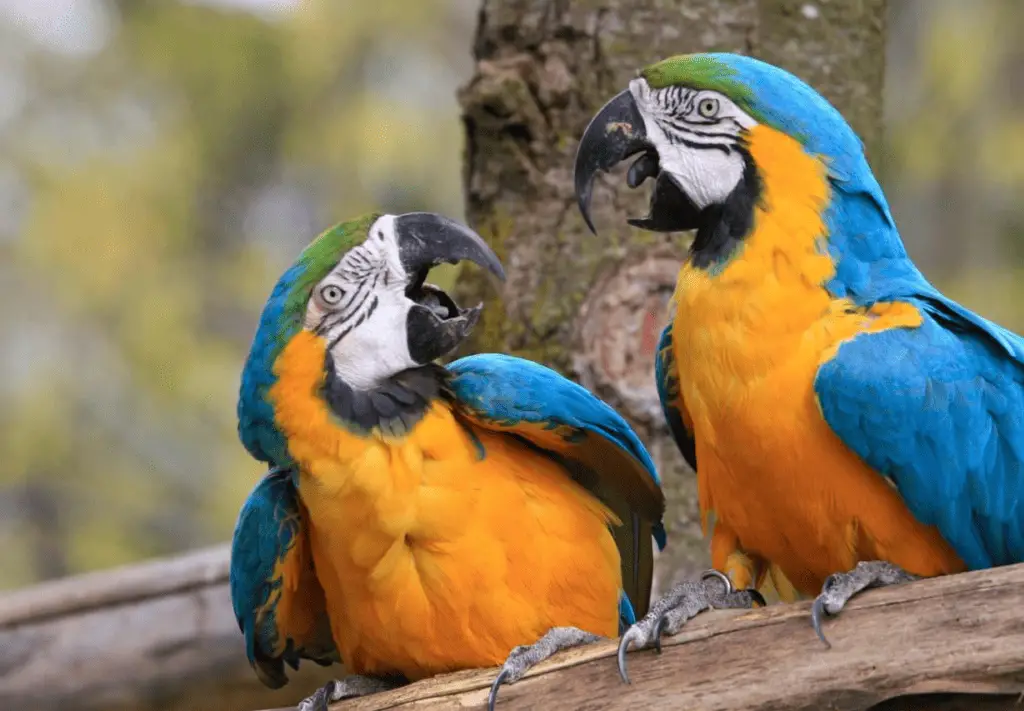
Macaws are naturally vocal and loud, and this may be a fact that some prospective Macaw Blue and Gold owners may not know. Before you purchase a Macaw Blue and Gold, one key consideration is knowing if you are comfortable enough to deal with the noise your pet may make– even during ungodly night hours.
Macaws can produce extremely loud, as typically, their noise level matches the environment. As such, it is pretty rare for a Macaw to be more silent than their living environment. This noise level can be a big issue, as a nuisance for yourself, and when living in tight spaces such as condos and high-rises with strict noise compliance laws.
However, all hope is not lost. Macaws are trainable, considering their clever and quick-witted nature. Teaching your Macaws to control their vocalizations is quite helpful in reducing noise levels around a household. Moreover, with a professional trainer, you have a good chance of significantly reducing the amount of noise.
Health Concerns
Now that we have discussed a Macaw Blue and Gold’s lifespan let us also tackle the health concerns a Macaw Blue and Gold may experience during their lifetime. Below we discuss common health concerns Macaws may face during their lifetime:
- Flight and tail feather chewing – This is commonplace within young Macaws. To alleviate this, try introducing toys and other stimulants to your Macaw.
- Macaw Wasting Disease (Proventricular Dilatation Disease) – manifested with weight loss and an increase in appetite, the Macaw wasting disease is a fatal viral disease that interferes with the digestion system of a Macaw. The incubation period for this disease can last up to a year, and currently, there are no known cures, says PetMD.
- Fungal Infections – Common bacteria and fungi can cause these infections in the environment and can cause serious health problems in birds. Maintaining a clean and hygienic living environment for your Macaw is crucial; regularly cleaning their cage, food, and water bowls. You should also avoid feeding your bird any questionable foods and remove any moist foods from their cage after a few hours.
While your Macaw might have health concerns occasionally, having a rigid diet plan and exercise and playtime schedules should help remove the risk of your Blue and Gold Macaw from catching diseases.
Conclusion and Final Thoughts
The Macaw Blue and Gold is a stunning avian that can come with a high price tag due to various factors such as location, age, gender, and pedigree. Before purchasing a Blue and Gold Macaw, it is essential to consider several factors such as diet, housing, socialization, behavioral problems, lifespan, noise, and health concerns. Blue and Gold Macaws have specific dietary requirements that require extensive planning, and their cage should be at least three feet wide and two feet in height with non-toxic materials. Additionally, socialization is crucial for their emotional well-being, and owners should ensure that they have adequate interaction and playtime.
As a responsible pet owner, it should be your task to consider these factors and judge accordingly. Moreover, it is also best to develop contingency plans to tackle these issues better, supposing you push through with your interest in purchasing a Blue and Gold Macaw. However, always remember that love is critical to a good pet-owner relationship.
- “Feeding Pet Macaws” Laurie Hess, DVM, DABVP; Rick Axelson, DVM https://vcahospitals.com/know-your-pet/macaws-feeding
- Butcher G. and Mileshttps R., “UNDERSTANDING PET BIRD NUTRITION,”//edis.ifas.ufl.edu/publication/VM067
- “Macaw Lifespan, Species & Habitat | Types of Macaws”, Study, https://study.com/academy/lesson/macaw-lifespan-species-habitat.html
- “What is socialization,” Avian Enrichment.https://avianenrichment.com/learn/emotional-needs/social-interaction/what-is-socialization
- Jenkins JR. Feather picking and self-mutilation in psittacine birds. Vet Clin North Am Exot Anim Pract. 2001 Sep;4(3):651-67. doi: 10.1016/s1094-9194(17)30029-4. PMID: 11601106.
- “Macaw Wasting Disease in Birds,” PetMD, https://www.petmd.com/bird/conditions/digestive/c_bd_Proventricular_Dilatation_Disease.



